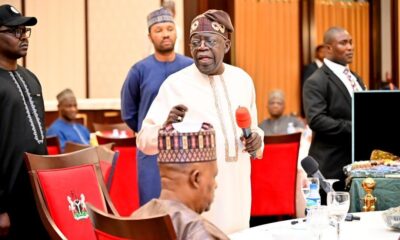News
BREAKING: Tinubu signs four tax reform bills into Law

President Bola Ahmed Tinubu has formally signed into law four significant tax reform bills recently passed by the National Assembly, marking a crucial step in his administration’s drive to restructure Nigeria’s fiscal framework and boost economic growth.
The signing ceremony, held at the Presidential Villa on Thursday, was attended by top government officials, including Senate President Godswill Akpabio, Speaker of the House of Representatives Tajudeen Abbas, and key committee chairmen on finance from both chambers of the National Assembly.
Also present were Kwara State Governor Abdulrazaq AbdulRahman, Imo State Governor Hope Uzodimma, Minister of Finance Wale Edun, and Attorney General of the Federation Lateef Fagbemi, SAN.
The newly signed bills, the Nigeria Tax Bill, the Nigeria Tax Administration Bill, the Nigeria Revenue Service (Establishment) Bill, and the Joint Revenue Board (Establishment) Bill, were the product of months of consultations with stakeholders and interest groups nationwide.
President Tinubu described the laws as a clear reflection of his government’s commitment to creating a fair, modern, and efficient tax system capable of stimulating investment, eliminating multiple taxation, and enhancing transparency in revenue collection.
The Nigeria Tax Bill aims to consolidate Nigeria’s scattered tax laws into a single, simplified framework to reduce duplication and ease compliance for businesses and individuals. Meanwhile, the Nigeria Tax Administration Bill provides a unified operational structure for tax administration at all government levels, aiming to foster better coordination and efficiency.
The Nigeria Revenue Service (Establishment) Bill repeals the Federal Inland Revenue Service (FIRS) Act and establishes a new, performance-driven Nigeria Revenue Service (NRS) with broader responsibilities, including the collection of non-tax revenues. It also introduces stringent transparency and accountability mechanisms.
Additionally, the Joint Revenue Board (Establishment) Bill sets up a national body to harmonise tax efforts across the country and includes provisions for a Tax Appeal Tribunal and a Tax Ombudsman’s Office, offering better protection for taxpayer rights and ensuring faster dispute resolution.
According to the Presidency, these reforms are expected to enhance government revenue, reduce investor uncertainty, create jobs, and improve the overall ease of doing business in the country. The laws also promise to lessen the tax burden on low-income earners, working families, and small businesses while eliminating outdated inefficiencies in the system.
President Tinubu emphasised that the new tax framework marks a departure from previous policies, establishing a fair, transparent, and modern tax system. He said, “For too long, our tax system has been a patchwork — complex, inequitable, and burdensome. It has weighed down the vulnerable and shielded inefficiency. That era ends today.”
He added that the reforms would form the groundwork for a future-focused Nigeria, unlocking opportunities for citizens while ensuring sustainable economic growth.
“This is the first major pro-people tax reform in a generation,” Tinubu stated on his verified X handle. “We are laying the foundation for a tax regime that rewards enterprise, protects the vulnerable, and mobilises revenue without punishing productivity.”
-

 NUJ FCT2 days ago
NUJ FCT2 days agoBREAKING: FCTA Health Mandate Secretary offers 150 free insurance slots to NUJ FCT members
-

 National News2 days ago
National News2 days agoTinubu accepts Egbetokun’s resignation, appoints Disu acting IGP
-

 News1 day ago
News1 day agoDSS arrests suspected ISWAP Commander linked to Owo Church massacre
-

 News1 day ago
News1 day agoActing IGP Tunji Disu arrives at Presidential Villa for official decoration
-

 News1 day ago
News1 day agoFCT Poll: INEC explains disputed result at Kwali voting centre
-

 News2 days ago
News2 days agoObi escapes attack as gunmen target ADC leaders in Edo
-

 News1 day ago
News1 day agoAtiku condemns attack on Obi, Oyegun, others, warns against political violence
-

 News1 day ago
News1 day agoEx-NRC MD Edetanle remanded over alleged N165m, $385,000 fraud


































